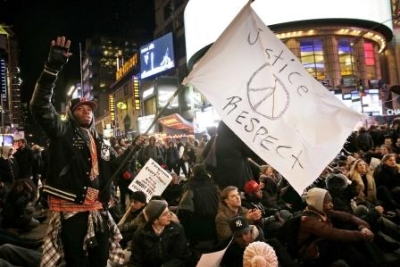by: Oren Segal
December 05, 2014
In the wake of two grand jury decisions—in Ferguson, MO and Staten Island, NY—not to indict the police officers who were involved in the killing of black men, the time has come to ask ourselves: Where do we go from here? There are a myriad of ideas and legislation on the table--diversity training for the police, funding to provide body cameras for police officers and legislation to tighten standards on military-style equipment for local police departments. These are all worthy ideas and should be pursued with both care and speed.
At the same time, as Americans, we need to come to grips with the concept of implicit bias and how it works its way into the small and big things in life.
Implicit bias is a positive or negative (usually negative) mental attitude toward a person or group that we hold at an unconscious level and without intentional control. The notion of implicit bias was conceived by Anthony Greenwald and Mahzarin R. Banaji in 1995 and there is now substantial and empirical support for the idea that most people hold implicit biases about minority and marginalized groups such as people of color, women, LGBT people and others.
Implicit bias happens when two job applicants—one named Ayesha and the other, Allison submit the exact same resume for a job and Allison is 50% more likely to get a call. Implicit bias fuels the school to prison pipeline that disproportionately disciplines, suspends and expels students of color in our nation’s schools. Implicit bias propels the microaggressions many people experience on a daily basis, which can often “feel like broken glass.” The fact that African Americans are disproportionately represented in all levels of the criminal justice system can be seen as implicit bias.
When schools want to address bias in the classroom, they tend to focus on discrimination and overt forms of racism, sexism and other injustices. This is critical. However, in order for our society to make a fundamental change, we need to also talk about, explain, teach, understand and do something about implicit bias.
Some ideas for educators and parents:
- When children are very young, in school and at home, make sure that their lives are filled with a diversity of people, activities, curriculum and books that reflect our larger society. Help them explore prejudice, fairness and bullying.
- Create anti-bias learning environments where different perspectives are not only welcomed, but seen as enriching and a strength. Actively challenge biased language and actions in the classroom and at home.
- As students get older, educators need to engage in a personal self-assessment on their unconscious bias and make sure it does not seep into their interactions with students. They should regularly affirm and model that all lives matter, examining inequitable school discipline policies and the achievement gap.
- Teach about Ferguson and beyond, helping students to understand the racial disparities in the criminal justice system and solicit their ideas for turning this around.










